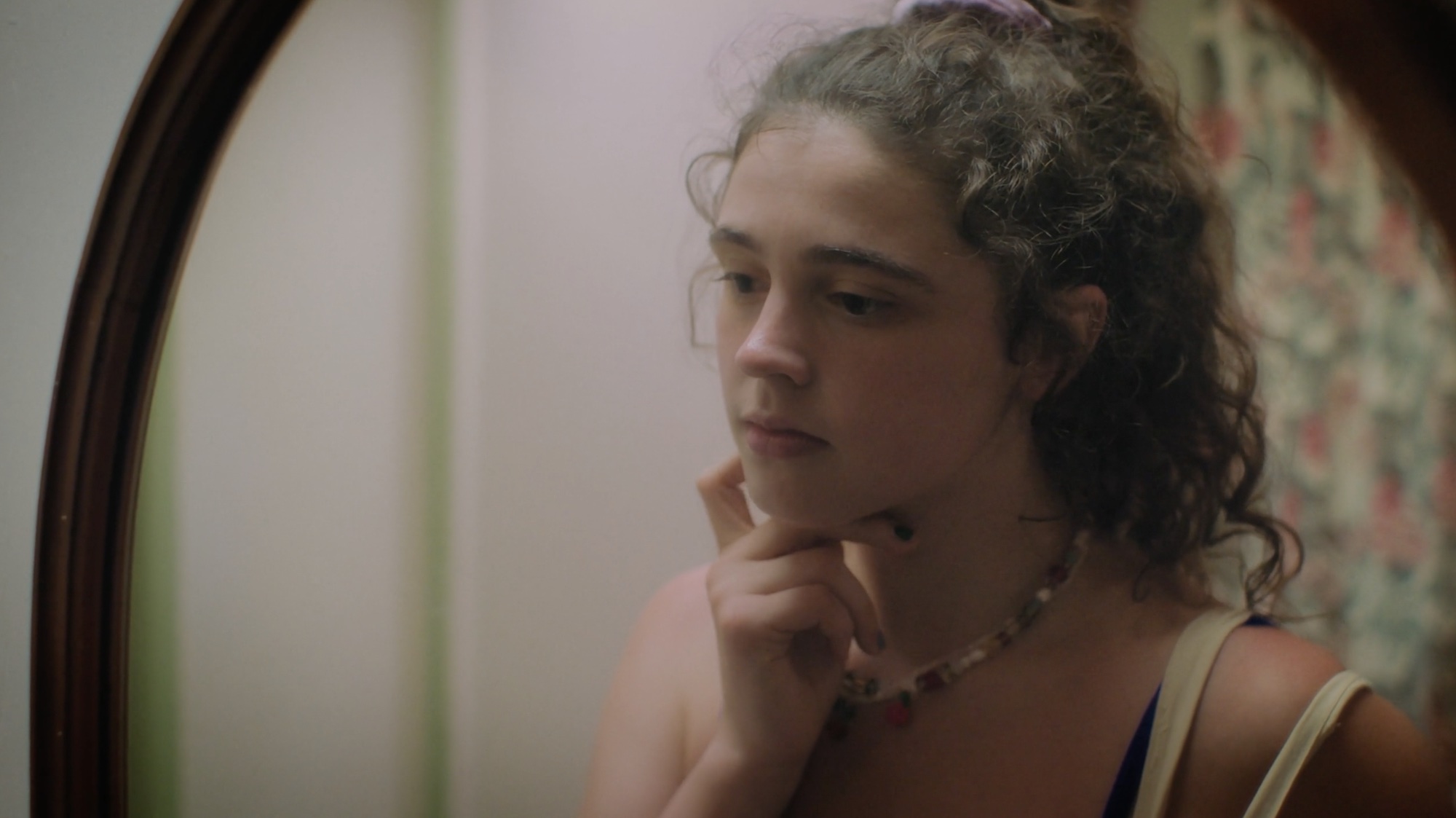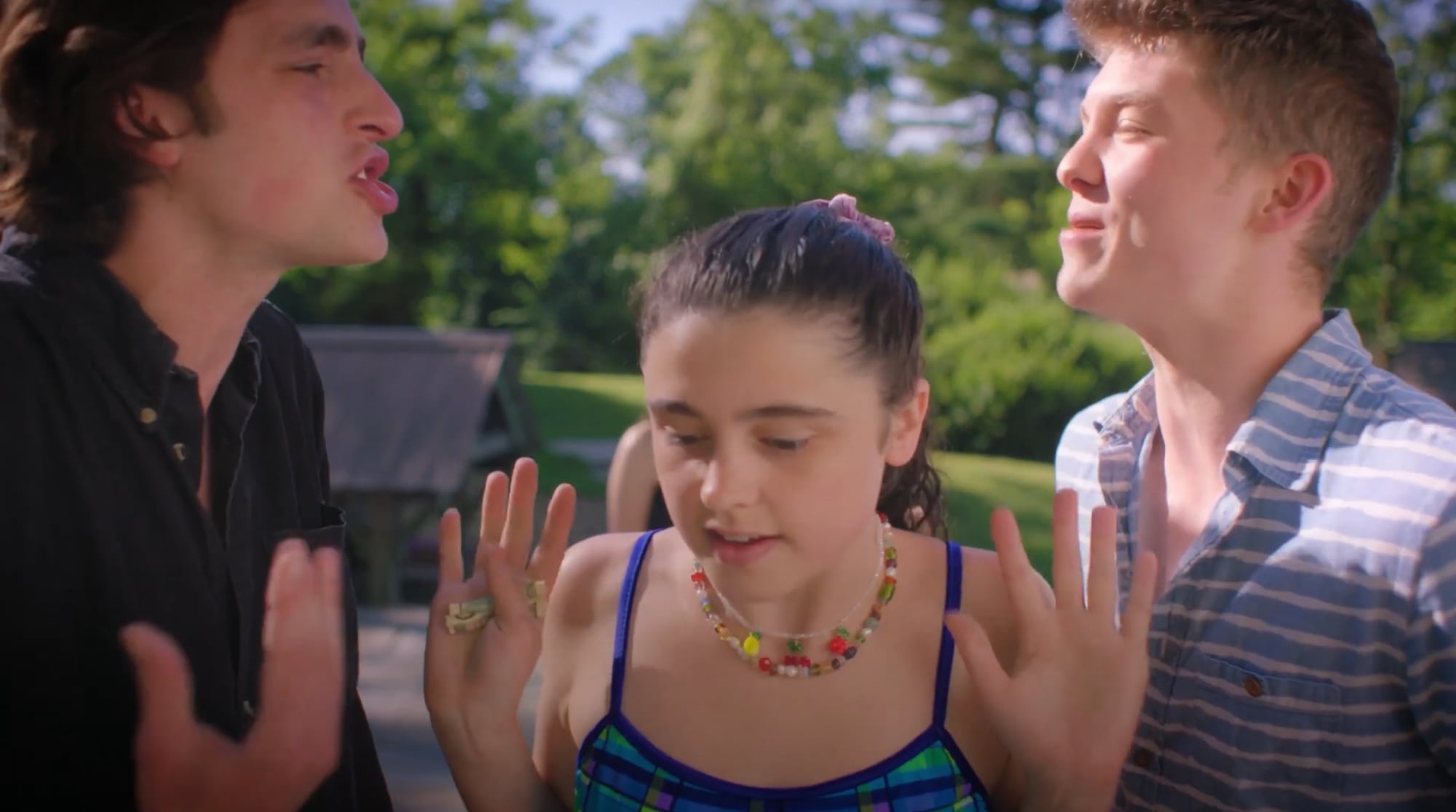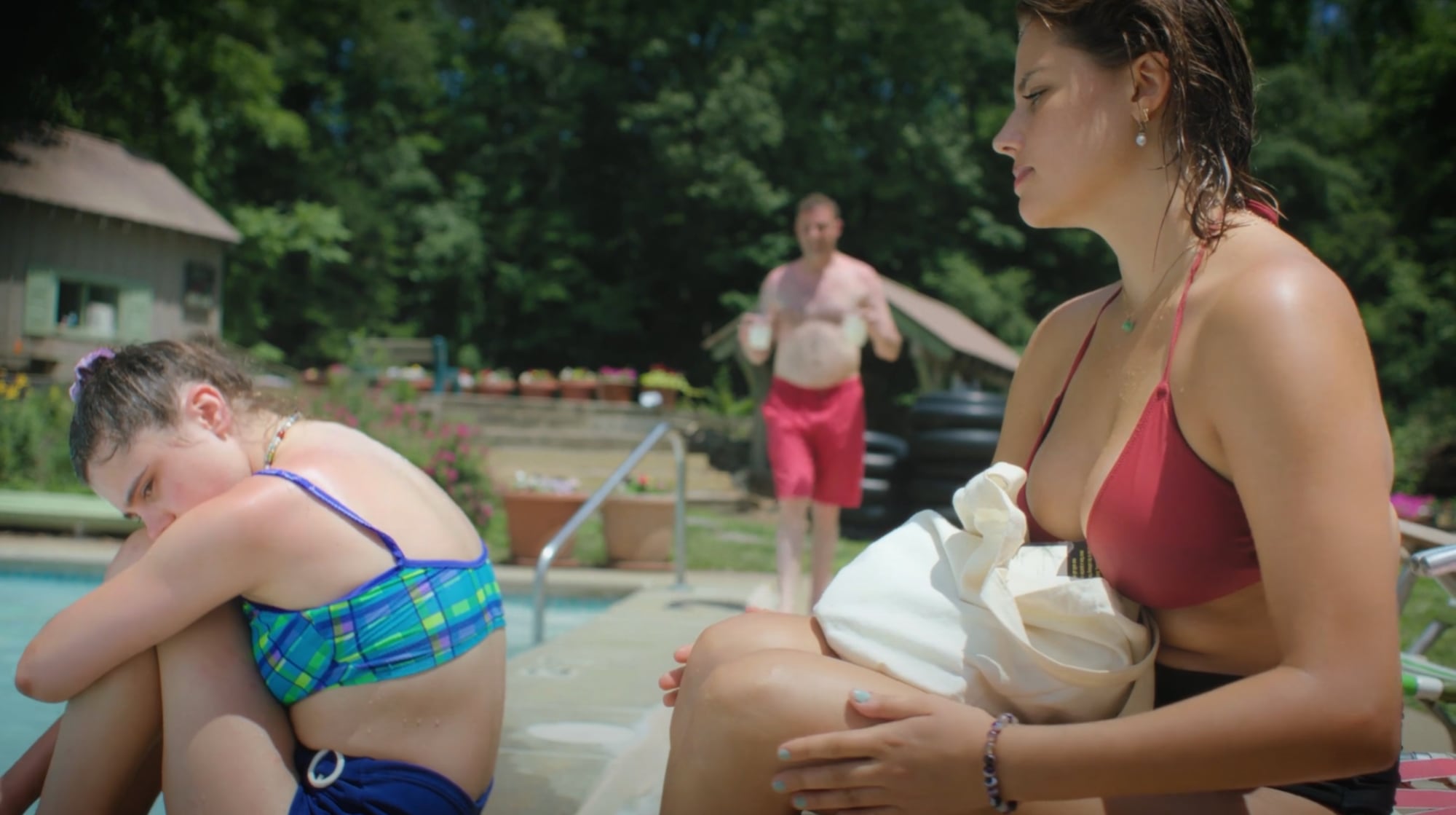
Coming of age stories are forever popular for their ability to capture the awkwardness of a person scrambling for a sense of identity alongside the discovery of burgeoning emotions they weren’t previously aware of. As we’ve seen with Greta Gerwig’s Lady Bird and Charlotte Wells’ Aftersun in recent years, teen stories centred around girls don’t need to be restricted to the conventional trope of falling in love for the first time. Instead, these films delve into the relationships that girls have with themselves and their families. Kali Kahn’s Father’s Day continues along this progressive narrative path with its depiction of a teenage girl named Ceci and the discovery of her father’s knotty male behaviour. Kahn expertly captures the questionable conduct of men and the guilt felt when one woman betrays another in subtly authentic ways throughout her short, cleverly allowing a seemingly sparkly day by the pool to become much more fraught. DN spoke with Kahn about the specificity of her casting, the thematic importance of the swimming pool setting, and the different responses Father’s Day has garnered from men and women.
How did you look to cast Ceci and Claudia? Both characters showcase mature and immature tendencies in different parts of their personalities, was that an aspect you were looking for in your actors when casting?
I always knew from the first draft of the script that the character of Ceci was going to be difficult to cast. I wanted someone who was above the age of 20, not just for logistical reasons but because I wanted someone with a little distance and perspective on those awkward teenage years so we could analyse the story together. As you can imagine, it’s a very small pool of adult woman actors who can convincingly look and play 15 years old. I met the Actor Tori Lemelin through my acting professor at Columbia and immediately knew she was the one. Tori already looks pretty young which helps, but it’s really her physicality that sells people on the character. In Father’s Day, it’s in the way she moves her body, the faces she makes, the way she stomps around and bangs into things, fidgets with her jewellery, all of it. There’s something totally cartoonish and clumsy about the way she plays that character and she added an important layer of humour and cringe to the story that wasn’t fully there in the script. Only really great actors are able to do that.
Emma Cuba, who plays Claudia, is actually a friend of mine from Miami. I didn’t care what the character of Claudia looked like, I just knew she needed to be cool as fuck, the kind of woman I would admire and want to be when I was 15, and Emma is totally that kind of person in real life. She has this radiant presence that I had no doubt would translate on the screen. That’s usually how I cast, I think of the most charming and captivating people I know in real life and ask them to be in my films.
There’s something so innocent and intimate about father-daughter relationships at that young age, and I wanted the music to reflect that.
The music throughout the film underlined everything for me with a sense of romance and serenity alongside the characters’ awkward interactions. What brought you to that choice?
I love love love Chavela Vargas. Romanticism is exactly what I was going for. There’s something so innocent and intimate about father-daughter relationships at that young age and I wanted the music to reflect that. At the same time, the story I’m telling is about a teenage girl at the precipice of adulthood, as she’s beginning to see her father in a different light and recoil from his intimacy and touch, so I wanted the music to be undercut with a similar darkness. There’s a strained and gritty quality to Chavela’s voice that skewers the romantic and hetero overtones of the ballads she sings, so I always had her music in mind for the movie. I remember listening to her album Noche de Ronda on repeat around the time of wrapping and I just couldn’t stop hearing it over the images of the movie. I never even tried any other music.


Ceci shows a slight fascination with Claudia in the beginning in the women’s changing room, we see this through the reoccurring glances in the reflection of the mirror. How did you block that scene? What was your intention with that moment?
A pattern I’ve noticed is that men and women have totally different understandings of what’s going on in that scene. I’d say 90% of the men whom I screened the film for when I was editing it, projected sexual attraction onto Ceci. Most of the women who watched it had the same interpretation as you, that Ceci is simply drawn to Claudia and wants to be like her, because when you’re that age the spectre of womanhood is opaque and mysterious so you’re searching for someone to identify with. My hope is that the absence of the mother in the story makes that emotional need in Ceci’s character all the more palpable, but if people want to project sexual attraction then I guess that’s fine, fascination and attraction are often difficult to disentangle in real life. For many women, their first memory of seeing a naked body is in a changing room and I think that’s a really impactful coming of age moment, especially because it exists totally outside of the male gaze, so I also wanted to plant that in the beginning to kind of bookmark where Ceci was at in her maturity.
I also wanted to set up that kinship with Claudia early on in the story so that when Ceci tears her down later, you feel it even more. I’m not sure if this is legible in the film, but Claudia is also fascinated by Ceci in that scene because she has something that Claudia doesn’t. A naiveté, an invisibility, a lack of sexuality. The admiration is meant to flow in both directions. My DP Agustina Biasutto and I went in with a pretty solid idea of what the scene was about and the beats we needed to hit, so naturally all of the action and dialogue centres around that little mirror that came from my bedroom.
For many women, their first memory of seeing a naked body is in a changing room and I think that’s a really impactful coming of age moment, especially because it exists totally outside of the male gaze.

When the father Eric first talks to Claudia at the poolside we only see him in the frame very up close and his words are slightly muffled.
My initial cut didn’t have that. We only saw them from a distance the entire time because I wanted to create dramatic irony between what we the mature audience knew was happening, and the villainous intentions that Ceci was projecting onto Claudia. But sometimes you make these intellectual decisions and the audience doesn’t feel them, so I needed to show the father’s intrusion on Claudia in a more visceral way so that I could charge those distant shots with more meaning. Ariel Eliaz who plays the father is brilliant. I remember him telling me at the beginning of the shoot, “You know what it takes for a man to get the wrong idea from a woman? Just a simple “Hello”” and I think he really conveys that in his performance.
The story begins with a typical dad and daughter situation, a piggyback on the way to the pool, we then see photos of many different dads and daughters. The film then ends with Ceci hanging her head as she watches a dad and daughter swimming by, giggling. At what stage did you land on the cyclical nature of the narrative?
That wasn’t planned at all actually. On the last day of shooting, a father and daughter showed up at the pool and I told my DP Agustina, “We have to film these people swimming by Tori”. Kudos to her for getting on board with it and doing a completely new camera set up at the last second. I like to think of it as cyclical too, that all of the girls in those photos have been through something similar to Ceci. I think that’s exactly what makes the ending so tragic, that the girl in the pool will almost definitely go through some version of what Ceci just went through on this day. It’s inevitable, and there’s no way to restore that intimacy once it’s been corrupted.

The men across Father’s Day demonstrate intrusive behaviours, what drew you to present them that way?
I think it goes back to the cyclical nature of the film, the idea that men are often oblivious to women’s discomfort and how those behaviours ripple through generations in big and small ways.
It’s inevitable, and there’s no way to restore that intimacy once it’s been corrupted.
What was it about the setting of the pool that drew you to set the film in that location?
I love pools, three of my films have pools in them. I’m from Florida so a lot of my coming of age experiences centre around water. My first kiss was literally underwater. I’ve also been pretty body conscious my whole life so wearing a bathing suit in public was mortifying for me as a teenager, especially around my father. I absolutely dreaded it. I’m a big proponent of people making films about the things that make them cringe because those are the most authentic and relatable stories. I can’t remember where the idea came from, but I’m sure I just imagined the most unbearable situation possible and arrived at everyone being in bathing suits at a public pool.

How did you find your ending? That moment between Claudia and Ceci says so much by literally saying so little.
I actually wrote and shot an additional ending. Everything still happens as it does in the film, but then Ceci swims off and screams something underwater. The true ending of the film for me is the legs. It’s the most subjective shot in the entire film, and it’s meant to convey a brand new self-awareness that Ceci has or something like that. I found that entirely in the edit, I put it there just to try it and I remember immediately feeling, “holy shit, that’s it.” I love how visceral it is. But the beat where Ceci and Claudia are just sitting in the silence was always there because I knew that was always going to be the ultimate reckoning for Ceci—to come face to face with how her father has made a woman feel. That was always the whole point of the story for me, so that’s how the culminating moment of discomfort ended up manifesting.
What can we expect from you next?
I’m currently finishing up my MFA at Columbia University and developing a feature script. But, I do have a new short coming, shot in Miami, that I’m putting on the festival circuit right now, it’s In the Absence of Fruits and Flowers and it follows a young man on his 23rd birthday as he struggles to reconnect with his estranged father.


